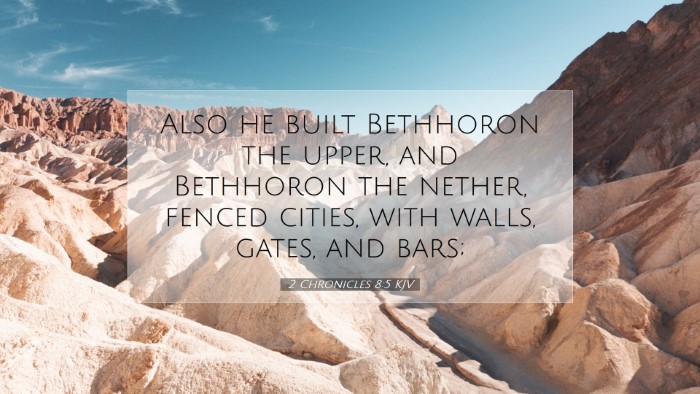Commentary on 2 Chronicles 8:5
Bible Verse: "And he built Beth-horon the upper, and Beth-horon the nether, fenced cities, with walls, gates, and bars." (2 Chronicles 8:5)
Introduction
The verse encapsulates a vital period in the history of Israel during King Solomon's reign. It reflects the king's commitment to establishing fortified cities, indicative of both economic and military strength. This commentary will draw insights from prominent public domain commentaries to expound on the contextual, theological, and practical implications of this verse.
Contextual Analysis
In 2 Chronicles 8, we observe Solomon's extensive building projects, which serve to strengthen his kingdom. The mention of Beth-horon as a site of fortification is significant. As noted in the Matthew Henry Commentary, these cities not only served as military outposts but also played key roles in trade and communication routes between Judah and the northern tribes of Israel. Understanding the geographical importance of Beth-horon aids our comprehension of Solomon's strategic foresight in fortifying these locations.
The Architectural and Military Significance
According to the Albert Barnes' Notes on the Bible, the construction of “fenced cities” highlights an era where defense was paramount. These cities were equipped with “walls, gates, and bars,” illustrating a deliberate commitment to protection against potential invasions. The fortifications served as both a deterrent to outside forces and a symbol of Solomon’s wisdom in governance. Furthermore, the Adam Clarke Commentary emphasizes the dual purpose of these constructions, acting as sanctuaries for the populace while enhancing national security.
Theological Insights
This verse can also be viewed through a theological lens. The act of building is often seen in Scripture as a divine metaphor for establishment and security. God’s covenant with Israel promised peace and prosperity, which Solomon sought to embody through these fortifications. As Matthew Henry elucidates, the cities' defensive structures represent the steadfastness of God’s promises. It is a reminder that like Israel, believers today are called to build their lives on the foundations of God's Word, seeking His refuge and security amidst life's adversities.
Symbolism of Beth-horon
Beth-horon, both upper and nether, holds biblical symbolism beyond its physical characteristics. As the Barnes' Notes outline, its location at the crossroads of significant routes meant it was pivotal for trade and army mobilization. This speaks to our spiritual journey; the places we fortify in our lives—be they our faith, relationships, or moral stands—often become critical intersections through which God leads us and protects us.
Lessons for Today’s Believers
For pastors and students of the Scripture, this verse serves as both a historical account and a lesson in spiritual fortification. Just as Solomon built physical cities, believers are called to erect spiritual strongholds in their lives. This alludes to the need for vigilance, prayer, and the diligent study of the Word. According to Clarke’s insights, every believer must recognize the spiritual battles that exist and fortify their faith through sound doctrine and righteous living.
- Faith as a Fortress: Like Solomon's cities, our faith should be a stronghold, impervious to doubt and despair.
- Community and Support: Just as fortified cities offered refuge, the Church serves as a community for support and protection.
- Guardianship: A reminder that we must guard our hearts and minds against influences that seek to weaken our spiritual resolve.
Conclusion
2 Chronicles 8:5 offers a penetrating glimpse into the administrative wisdom of Solomon and provides rich material for personal reflection and teaching. By fortifying Beth-horon, Solomon exemplified strategic leadership in safeguarding his kingdom. For modern believers, this verse serves as a powerful metaphor for building resilience in faith, ensuring that the spiritual cities of our lives are also well-fortified against the challenges we encounter. In sum, this scriptural account continues to be relevant, urging us to seek God’s strength and wisdom in all our undertakings.


